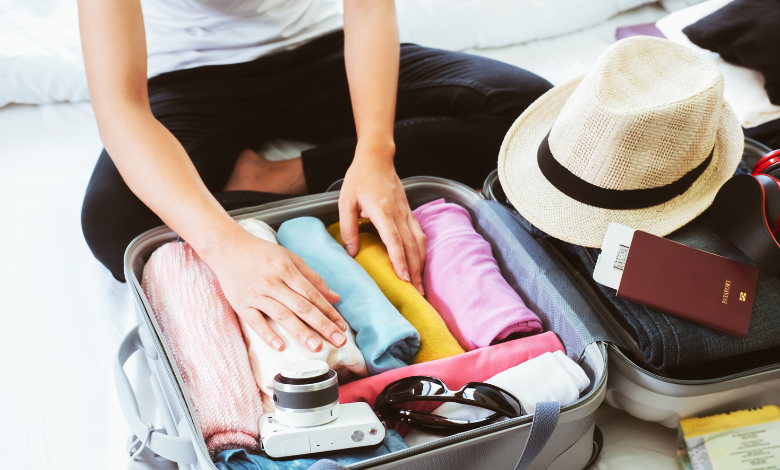Traveling is an exhilarating adventure that opens doors to new experiences and cultures. However, it often comes with its fair share of stressors. From navigating unfamiliar airports to packing efficiently, the journey to your destination can sometimes feel overwhelming. In this guide, we’ll uncover practical tips and tricks to ensure your travels are as smooth and stress-free as possible.
Setting the Tone: The Allure of Stress-Free Travel
The prospect of stress-free travel is undoubtedly enticing. Picture yourself gliding through security with ease, sipping a refreshing drink as you await your flight, and arriving at your destination feeling relaxed and ready to explore. By implementing the strategies outlined in this guide, you can turn this vision into a reality.
Understanding Common Travel Stressors
Before delving into the specifics of stress-free travel, it’s essential to recognize the common stressors that travelers often encounter. These may include packing woes, navigating unfamiliar transportation systems, and dealing with unexpected delays or cancellations. By acknowledging these challenges upfront, you can better prepare yourself to overcome them and enjoy a smoother journey.
Pre-Trip Preparation

Preparing for your journey is key to reducing stress and ensuring a smooth travel experience. By taking the time to plan and organize before you depart, you can minimize potential setbacks and focus on enjoying your trip to the fullest.
Researching Your Destination
Before you embark on your adventure, it’s essential to research your destination thoroughly. This includes familiarizing yourself with the local culture, customs, and language. Take the time to learn about any specific entry requirements or visa regulations that may apply to your destination. Additionally, research popular attractions, dining options, and transportation methods to help you plan your itinerary effectively.
Packing Essentials
Packing efficiently can save you time and stress during your travels. Start by making a list of essential items you’ll need for your trip, such as clothing, toiletries, and medications. Consider the climate and activities you’ll be participating in to ensure you pack appropriately. When packing your suitcase, prioritize versatile clothing items that can be mixed and matched to create multiple outfits. Utilize packing cubes or compression bags to maximize space and keep your belongings organized.
Organizing Documents and Itinerary
Keeping your documents and itinerary organized is crucial for a stress-free journey. Make sure you have all necessary travel documents, including your passport, visa (if required), boarding passes, and travel insurance information. Consider creating digital copies of important documents and storing them securely on your smartphone or cloud storage platform. Additionally, prepare a detailed itinerary outlining your travel plans, including transportation details, accommodation reservations, and any activities or excursions you have scheduled. Having everything neatly organized will help alleviate stress and ensure you stay on track throughout your trip.
Planning Transportation

Choosing the right mode of transportation and making necessary arrangements in advance can significantly contribute to a stress-free travel experience. Whether you’re traveling by air, train, bus, or car, careful planning can help ensure a smooth journey from start to finish.
Choosing the Right Mode of Transportation
Selecting the most suitable mode of transportation for your trip depends on various factors, including your destination, budget, and personal preferences. Consider the distance you’ll be traveling, as well as the availability of transportation options in the area. While air travel is often the quickest option for long-distance journeys, trains or buses may be more convenient for shorter trips or travel within a specific region. If you prefer the flexibility of driving, renting a car can provide you with the freedom to explore your destination at your own pace.
Booking Flights and Accommodations Strategically
When booking flights, aim to secure tickets well in advance to take advantage of lower fares and better seat options. Use flight comparison websites or apps to compare prices and find the best deals. Additionally, consider factors such as layovers, travel time, and airline amenities when making your selection. Similarly, when booking accommodations, research different options in your destination and read reviews from other travelers to ensure you choose a comfortable and conveniently located place to stay. Look for accommodations that offer amenities such as free Wi-Fi, breakfast, and transportation services to enhance your overall travel experience.
Navigating Airports and Stations Efficiently
Navigating airports and train or bus stations can be overwhelming, especially if you’re unfamiliar with the layout or procedures. To streamline the process, arrive early and allow ample time to check-in, pass through security, and locate your gate or platform. Familiarize yourself with the airport or station layout beforehand and take advantage of signage and information desks for guidance. Consider downloading travel apps or using online resources to access real-time flight or train information, track delays, and find amenities such as restrooms, restaurants, and lounges. By planning ahead and staying organized, you can navigate transportation hubs with ease and minimize stress during your travels.
Budgeting Wisely

Managing your finances effectively is crucial for a stress-free travel experience. By creating a realistic budget and making smart spending decisions, you can stretch your funds further and avoid unnecessary financial stress during your trip.
Creating a Realistic Travel Budget
Before you embark on your journey, take the time to create a detailed travel budget outlining your estimated expenses. Consider factors such as transportation, accommodation, meals, activities, and souvenirs. Research the cost of living in your destination and factor in any additional expenses, such as visa fees or travel insurance premiums. Be sure to account for unexpected costs or emergencies by setting aside a contingency fund. By planning ahead and setting clear spending limits, you can avoid overspending and ensure that your funds last throughout your trip.
Finding Deals and Discounts
Stretch your travel budget further by seeking out deals and discounts on flights, accommodations, and activities. Look for promotional offers, loyalty programs, and travel packages that can help you save money on your trip. Consider booking accommodations through platforms that offer discounted rates or cashback rewards. Likewise, explore options for discounted transportation passes, attraction tickets, and dining vouchers. By taking advantage of special offers and promotions, you can enjoy more experiences without breaking the bank.
Managing Expenses on the Road
Once you’re on your journey, continue to monitor your spending and adjust your budget as needed. Track your expenses carefully and prioritize your spending on experiences that matter most to you. Look for ways to save money, such as cooking your meals instead of dining out or opting for free or low-cost activities and attractions. Be mindful of foreign transaction fees and exchange rates when using credit cards or withdrawing cash abroad. Consider carrying a mix of payment methods, including cash, credit cards, and prepaid travel cards, for added flexibility and security. By staying vigilant and making savvy financial decisions, you can keep your travel budget in check and enjoy a stress-free journey.
Health and Safety Measures

Ensuring your health and safety while traveling is paramount to enjoying a stress-free journey. By taking proactive measures to protect yourself and mitigate potential risks, you can focus on making lasting memories during your trip.
Staying Healthy While Traveling
Maintaining good health while traveling begins with proper preparation and precautionary measures. Prior to your departure, consult with your healthcare provider to ensure you are up-to-date on vaccinations and discuss any specific health concerns related to your destination. Pack a travel health kit containing essential medications, first aid supplies, and personal hygiene items. Practice good hygiene habits, such as washing your hands frequently and using hand sanitizer, to prevent the spread of illness. Stay hydrated by drinking plenty of water, especially in hot or humid climates, and be mindful of your dietary choices to support your overall well-being.
Safety Tips for Solo Travelers and Groups
Whether you’re traveling solo or with companions, prioritizing safety is essential. Solo travelers should take extra precautions to protect themselves, such as avoiding unfamiliar areas at night and staying alert in crowded or touristy areas. It’s also advisable to share your itinerary with trusted individuals and check in regularly to ensure your whereabouts are known. When traveling in groups, establish clear communication channels and designate a meeting point in case members become separated. Remain vigilant of your surroundings and be prepared to adapt to changing circumstances to ensure the safety of yourself and your travel companions.
Dealing with Emergencies Abroad
Despite your best efforts to plan and prepare, emergencies can still occur while traveling. It’s important to familiarize yourself with local emergency procedures and contact information for healthcare facilities, emergency services, and your country’s embassy or consulate. Keep important documents, such as your passport and travel insurance information, secure and easily accessible in case of an emergency. If you find yourself in a crisis situation, remain calm and seek assistance from local authorities or trusted individuals. By staying informed and proactive, you can effectively manage emergencies and minimize their impact on your travels.
Managing Stress During Travel

Traveling can be exciting, but it can also be accompanied by stressors that can dampen your experience. By implementing effective strategies to manage stress, you can navigate challenges with ease and enjoy a more relaxed journey.
Coping Strategies for Travel Anxiety
Travel anxiety is a common concern for many individuals, but there are several techniques you can use to alleviate stress and promote a sense of calm. Practice deep breathing exercises or mindfulness meditation to help center your mind and reduce feelings of anxiety. Engage in physical activity, such as walking or stretching, to release tension and boost your mood. Additionally, distract yourself from negative thoughts by listening to music, reading a book, or engaging in a creative activity. By focusing on the present moment and adopting a positive mindset, you can effectively manage travel-related anxiety and enjoy a more enjoyable journey.
Relaxation Techniques for Long Journeys
Long journeys can be physically and mentally exhausting, but there are ways to make them more comfortable and enjoyable. Take regular breaks to stretch your legs, hydrate, and refresh yourself. Bring along comfort items, such as a travel pillow, blanket, or eye mask, to help you relax and rest during transit. Practice relaxation techniques, such as progressive muscle relaxation or visualization exercises, to ease tension and promote relaxation. Consider incorporating entertainment options, such as movies, podcasts, or audiobooks, to keep yourself entertained and pass the time more quickly. By prioritizing self-care and comfort, you can make long journeys more bearable and reduce stress along the way.
Making the Most of Delays and Setbacks
Despite your best efforts to plan and prepare, delays and setbacks can occur unexpectedly during travel. Instead of letting these challenges ruin your trip, view them as opportunities to adapt and explore new experiences. Use delays as an opportunity to explore the airport or station, indulge in a delicious meal, or catch up on work or leisure activities. Maintain open communication with airline or transportation staff to stay informed about the status of your journey and any potential updates or alternatives. Remember to remain flexible and patient, and trust that you will eventually reach your destination. By embracing the unexpected and maintaining a positive attitude, you can effectively manage delays and setbacks and maintain your peace of mind during travel.
Enjoying Your Destination

Once you’ve arrived at your destination, it’s time to immerse yourself in the local culture and embrace all that it has to offer. From exploring iconic landmarks to sampling delicious cuisine, there are countless opportunities to make lasting memories and enjoy a fulfilling travel experience.
Immersing Yourself in the Local Culture
One of the most rewarding aspects of travel is the opportunity to immerse yourself in the local culture. Take time to explore your surroundings and engage with the local community. Visit museums, galleries, and historical sites to learn about the region’s rich history and heritage. Attend cultural events, festivals, or performances to experience traditional music, dance, and art firsthand. Don’t be afraid to step out of your comfort zone and try new things, whether it’s participating in a cooking class, learning a local dance, or striking up a conversation with a friendly local. By embracing the culture of your destination, you’ll gain a deeper appreciation for its uniqueness and enrich your travel experience.
Trying New Experiences and Foods
Travel is the perfect opportunity to step outside your culinary comfort zone and sample new and exciting flavors. Explore local markets, street food stalls, and restaurants to indulge in authentic dishes and culinary delights. Be adventurous and try regional specialties or dishes you’ve never encountered before. Don’t hesitate to ask locals for recommendations or insider tips on where to find the best eats. In addition to food, seek out opportunities for adventure and exploration. Whether it’s hiking through scenic landscapes, embarking on a wildlife safari, or trying adrenaline-pumping activities like zip-lining or scuba diving, there’s no shortage of thrilling experiences to enjoy. By embracing new experiences and flavors, you’ll create unforgettable memories and make the most of your time in your destination.
Conclusion
As you wrap up your travel adventure, take a moment to reflect on the experiences you’ve had and the memories you’ve created. Traveling can be both exhilarating and challenging, but by following the tips and strategies outlined in this guide, you can enjoy a smoother and more stress-free journey from start to finish.












